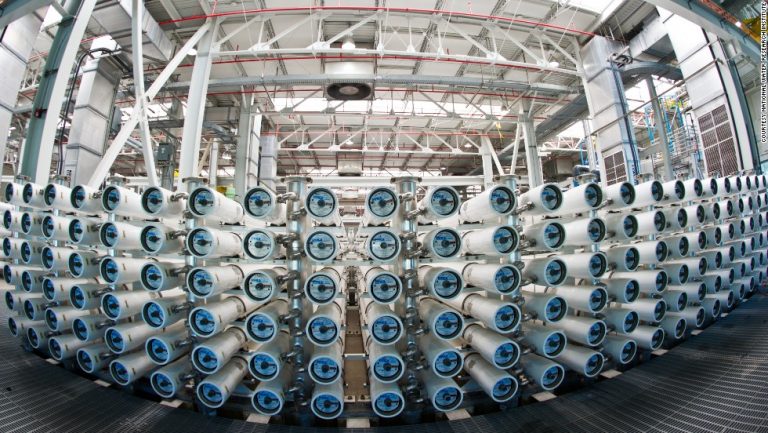How has GWT RO Waste Water Recycling Systems Helped Industrial Organizations Optimize Cost & Reuse Water?

Reverse osmosis desalination is not just useful for drinking water or process water dissolved solids removal. RO waste water recycling can make use of the reverse osmosis process in a tertiary stage treatment to greatly reduce total dissolved solids and increase the quality of the treated water. Post treated water can typically be reused in many industrial process water applications.
Many companies seek to treat their waste water to meet these high standards to combat the effects of water scarcity and meet sustainability goals.
In response, Genesis Water Technologies has helped many of our industrial clients to reduce their operating costs using RO waste water recycling with our engineered reverse osmosis desalination systems.
Below, are just a few of those cases.
Power generation boiler feed water
Power generation facilities use water to produce steam that powers the turbines that provide power to millions of homes and buildings across the world. The water used in the boiler system needs to be of a high quality, to ensure that the boiler runs as efficiently as possible.
Certain contaminants in feed water can cause corrosion and scale buildup that lower the thermal efficiency of the boiler and can potentially damage it.
Genesis Water Technologies (GWT) was contacted by a power generation client that needed a way to improve the quality of their feed water. It contained traces of hydrocarbons as well as heavy metals, dissolved salts, and hardness minerals.
Given a complete water analysis, GWT designed a customized treatment solution consisting of sediment and carbon filtration systems followed by scale prevention to protect the reverse osmosis desalination membrane that removed the dissolved salts. After that, the feed water did not require any further demineralization.
Genesis Water Tech also engineered, designed and supplied the system and it was installed by a local contracting firm with technical assistance. Today the high-quality feed water is produced within the requirements set by the client and allows the boiler to operate at maximum efficiency with lowered operation and maintenance costs.
Oil drilling produced water
During oil and gas mining operations, oil and gas aren’t the only materials that are found beneath the surface. Produced water is a considerable by-product of the oil extraction process. Its composition can vary from location to location. Produced water often contains varying levels of dissolved minerals, salts, heavy metals, and organic compounds. This brine solution can either be disposed of, or reused for further mining operations or other non potable uses.
An oil processing and recycling company consulted Genesis Water Technologies (GWT) for a treatment solution for the produced water resulting from oil extraction operations. They wished to sell the treated water for non-potable applications, including back to the oil processing industry clients.
The requested water analysis of this produced water fee sources, revealed high levels of TDS (35000 ppm) and hardness as well as nitrate, iron, sulfate, manganese, turbidity and color. GWT designed/engineered a treatment system consisting of an advanced oxidation unit followed by specialized backwash filtration systems and concluded with a RO waste water recycling system that included antiscalant dosing and cartridge filtration. GWT’s local contracting partner installed this system that has performed well within operating parameters. The system approach resulted in the removal of elevated suspended solids and color, dissolved metals, and reduced the TDS to less than 500 ppm. The system reduced the amounts of sludge produced, and the waste brine from the desalination process was safely disposed of.
Textile dying
From sheep and cotton fields to the clothes on your back or the sheets on your bed, textile production uses surprisingly large amounts of water. Cleaning raw material and dying fabrics are some of the main areas of use. As a result, textile waste water typically contain metals, phenols, color, pesticides, and phosphates, as well as high levels of TSS, TDS, BOD and COD. In the effort of sustainable water use, many textile production facilities are looking into wastewater treatment and tertiary RO waste water recycling as applicable.
Genesis Water Technologies (GWT) was contacted by a textile company that wanted to reduce their fresh water consumption in their processing and dying operations while also meeting increasingly strict discharge regulations. GWT consulted with client, and designed/engineered a suitable treatment solution. This included, a specialized self-cleaning filter, GWT specialized electrocoagulation system, followed by dissolved air flotation to remove coagulated solids. The process was finished with filtration systems and an RO waste water recycling system to polish the wastewater for reuse.
The result was a 75% reduction in discharge costs as well as operating costs associated with fresh water consumption. The sludge disposal costs were also lowered. The treated water was able to be reused in raw material cleaning and fabric dying.
Think GWT waste water treatment systems including RO waste water recycling can help your business reduce operating costs, meet sustainability goals, and combat water scarcity? Contact Genesis Water Technologies, Inc. toll free in the US at 877 267 3699, reach out to our local offices abroad or contact us via email at customersupport@genesiswatertech.com for an initial consultation to discuss your specific application.

